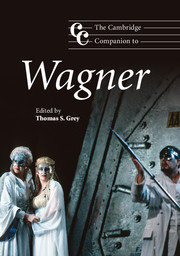Book contents
- Frontmatter
- PART I Biographical and historical contexts
- PART II Opera, music, drama
- PART III Ideas and ideology in the Gesamtkunstwerk
- PART IV After Wagner: influence and interpretation
- 13 “Wagnerism”: responses to Wagner in music and the arts
- 14 Wagner and the Third Reich: myths and realities
- 15 Wagner on stage: aesthetic, dramaturgical, and social considerations
- 16 Criticism and analysis: current perspectives
- Notes
- Select bibliography
- Index
15 - Wagner on stage: aesthetic, dramaturgical, and social considerations
from PART IV - After Wagner: influence and interpretation
Published online by Cambridge University Press: 28 September 2011
- Frontmatter
- PART I Biographical and historical contexts
- PART II Opera, music, drama
- PART III Ideas and ideology in the Gesamtkunstwerk
- PART IV After Wagner: influence and interpretation
- 13 “Wagnerism”: responses to Wagner in music and the arts
- 14 Wagner and the Third Reich: myths and realities
- 15 Wagner on stage: aesthetic, dramaturgical, and social considerations
- 16 Criticism and analysis: current perspectives
- Notes
- Select bibliography
- Index
Summary
There is no living style in the theater other than that of its time, whether it strikes future generations as unbearable kitsch or as greatness worthy of imitation.
wieland wagnerDid Richard Wagner invent the modern opera stage director? Or, at least, did the scenic and dramaturgical requirements of his stage-works establish the function of stage direction as a necessary and integral part of modern opera production? The answers to these questions – a qualified and a definite “yes,” respectively – have been frequently confirmed during the last half-century, a time when Wagner stagings have been perceived increasingly as a touchstone for major trends and styles of opera production worldwide. The main focus of the present chapter will be on Wagner stagings since the first postwar Bayreuth festival of 1951; but it is necessary first to consider some aspects of the first hundred years of Wagner onstage.
Wagner directs Wagner
Richard Wagner grew up, worked, and died in an age where there were no specialist opera directors. Stage productions were realized by a haphazard combination of stage manager, ballet master, composer, librettist, conductor, principal male singer, and (occasionally) a dramaturg. This tradition – or rather lack of one – died hard. As late as 1855 so theatrical a composer as Verdi could write with naïve delight about a newly published pamphlet prescribing the mise-en-scène of Les vêpres siciliennes that now “any child could do the staging.” Wagner himself had to be involved twice with compromised stagings of Der fliegende Holländer (The Flying Dutchman; the Dresden premiere in 1843 and his improvised Zurich “festival” of 1852) before confessing to Liszt that he had finally learned “with much trouble and toil, how important to this opera the décor is” (2 May 1852; SB IV:484–85).
- Type
- Chapter
- Information
- The Cambridge Companion to Wagner , pp. 246 - 275Publisher: Cambridge University PressPrint publication year: 2008
- 1
- Cited by



